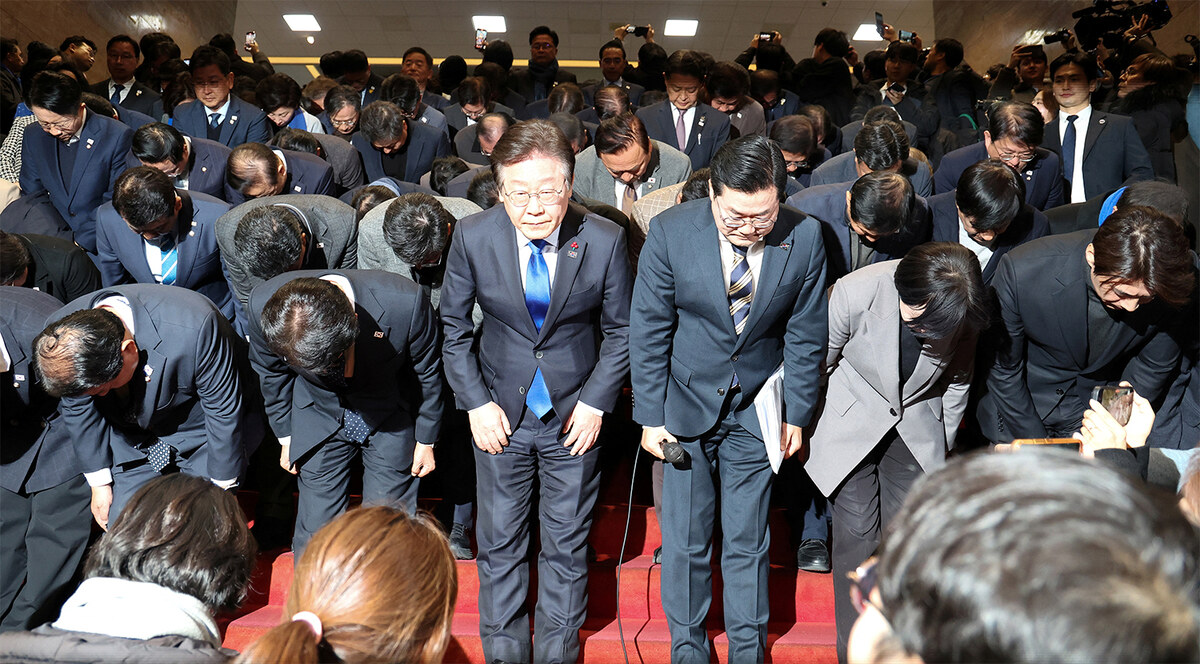Seoul: South Korean lawmakers on Saturday impeached President Yoon Suk Yeol over his failed martial law bid, with the opposition declaring a ÔÇ£victory of the people.ÔÇØ
The vote capped over a week of intense political drama in the democratic South following YoonÔÇÖs failed attempt to impose martial law on December 3.
Hundreds of thousands of people took to the streets of the capital Seoul in rival rallies for and against Yoon on Saturday.
In a televised address following the parliamentary vote, the impeached Yoon said he would ÔÇ£step asideÔÇØ but did not apologize for his botched bid to impose martial law.
Out of 300 lawmakers, 204 voted to impeach the president on allegations of insurrection while 85 voted against.
Three abstained, with eight votes nullified.
With the impeachment, Yoon has been suspended from office while South KoreaÔÇÖs Constitutional Court deliberates on the vote.
The court has 180 days to rule on YoonÔÇÖs future.
Chief Justice Moon Hyung-bae vowed to hold ÔÇ£a swift and fair trial.ÔÇØ
If the court backs his removal, Yoon will become the second president in South Korean history to be successfully impeached.
Prime Minister Han Duck-soo ÔÇö now the nationÔÇÖs interim leader ÔÇö told reporters he would ÔÇ£devote all my strength and efforts to ensure stable governance.ÔÇØ
Two hundred votes were needed for the impeachment to pass, and opposition lawmakers needed to convince at least eight parliamentarians from YoonÔÇÖs conservative People Power Party (PPP) to switch sides.
ÔÇ£TodayÔÇÖs impeachment is the great victory of the people,ÔÇØ opposition Democratic Party floor leader Park Chan-dae said following the vote.

Lee Jae-myung, leader of the main opposition Democratic Party and lawmakers of the party bow after the South Korean parliament passed a second impeachment motion against President Yoon Suk Yeol, at the National Assembly in Seoul, South Korea, December 14, 2024. (Yonhap via REUTERS)
PPP lawmaker Kim Sang-wook told broadcaster JTBC that Yoon had ÔÇ£completely betrayed the values of conservatism.ÔÇØ
ÔÇ£That is why we, as ruling party lawmakers, have decided to remove him ourselves,ÔÇØ he said.
A Seoul police official told AFP at least 200,000 people had massed outside parliament in support of removing the president.
Choi Jung-ha, 52, danced in the street after the vote.
ÔÇ£IsnÔÇÖt it amazing that we, the people, have pulled this off together?ÔÇØ she told AFP.
ÔÇ£I am 100 percent certain the Constitutional Court will side with the impeachment.ÔÇØ
On the other side of Seoul near Gwanghwamun square, police estimated 30,000 had rallied in support of Yoon, blasting patriotic songs and waving South Korean and American flags.
ÔÇ£Yoon had no choice but to declare martial law. I approve of every decision he has made as president,ÔÇØ supporter Choi Hee-sun, 62, told AFP before the vote.
The Democratic Party said ahead of the vote that impeachment was the ÔÇ£only wayÔÇØ to ÔÇ£safeguard the Constitution, the rule of law, democracy and South KoreaÔÇÖs future.ÔÇØ
ÔÇ£We can no longer endure YoonÔÇÖs madness,ÔÇØ spokeswoman Hwang Jung-a said.
At the rally outside parliament supporting impeachment, volunteers gave out free hand warmers on Saturday morning to fight the subzero temperatures, as well as coffee and food.
K-pop singer Yuri of the band GirlsÔÇÖ Generation ÔÇö whose song ÔÇ£Into the New WorldÔÇØ has become a protest anthem ÔÇö said she had prepaid for food for fans attending the demonstration.
ÔÇ£Stay safe and take care of your health!ÔÇØ she said on a superfan chat platform.
One protester said she had rented a bus so parents at the rally would have a place to change diapers and feed their babies.
Another said they had initially planned to spend their Saturday hiking.
ÔÇ£But I came here instead to support my fellow citizens,ÔÇØ Kim Deuk-yun, 58, told AFP.
YoonÔÇÖs future will now be determined by the court, which has previously blocked an impeachment.
In 2004, then-president Roh Moo-hyun was removed by parliament for alleged election law violations and incompetence, but the Constitutional Court later reinstated him.
The court currently only has six judges, meaning their decision must be unanimous.
Following SaturdayÔÇÖs vote, parliament speaker Woo Won-shik said the National Assembly would seek to nominate three more judges to the court as soon as possible.
ÔÇ£The future of South Korea lies within its people,ÔÇØ he said.
Yoon remained unapologetic and defiant as the fallout from his disastrous martial law declaration deepened and an investigation into his inner circle has widened.
His approval rating ÔÇö never very high ÔÇö plummeted to 11 percent, according to a Gallup Korea poll released Friday.
The same poll showed that 75 percent supported his impeachment.
Following YoonÔÇÖs impeachment on Saturday, a spokeswoman for the European Union called for a ÔÇ£swift and orderly resolutionÔÇØ to the political crisis in South Korea in line with the countryÔÇÖs constitution.
╠²
























